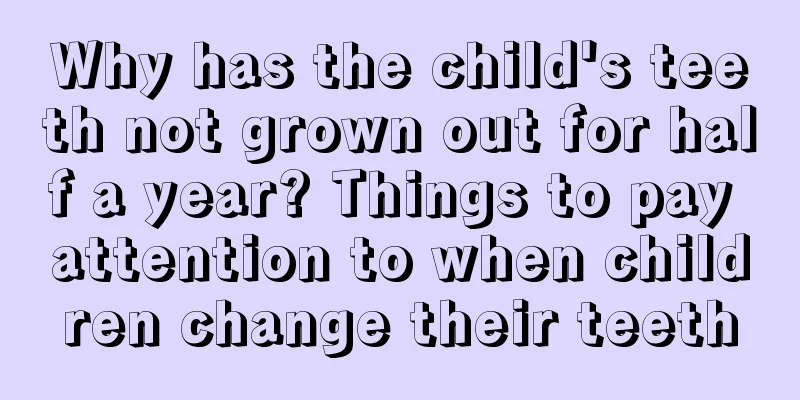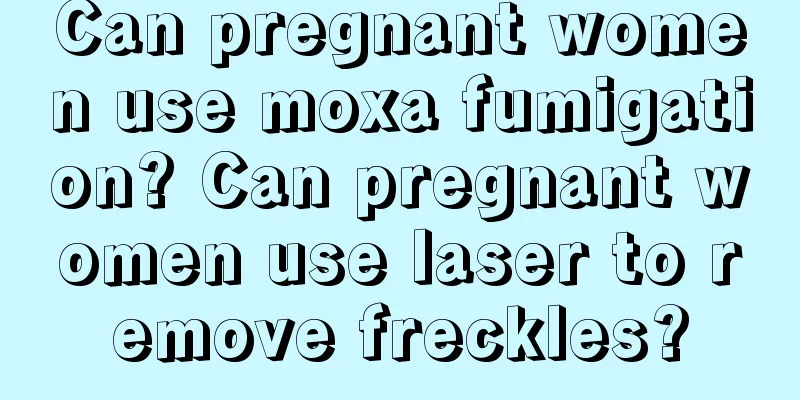Why has the child's teeth not grown out for half a year? Things to pay attention to when children change their teeth

|
Generally, after children have completed their tooth replacement, their teeth should grow very quickly. If they do not grow, there must be a problem. So how should this situation be solved? Let's introduce it together below! Tooth replacement is not longIf your child's teeth are not growing for a long time, it may be due to calcium deficiency. It is recommended that you go to the hospital to check the trace elements and supplement calcium appropriately. It is also related to the child's eating habits. It is recommended that the child eat more hard food, which will promote the eruption of teeth. If the permanent teeth have not erupted, it may be related to the congenital absence of the permanent tooth germ, or damage, poor development of the tooth germ, etc. It may also be due to malnutrition, endocrine metabolic disorders, premature extraction of deciduous teeth, etc. It is recommended to go to the hospital to take a dental X-ray. Why don't children's teeth grow?1. If the deciduous teeth fall out for a long time, the gums will be thickened, which will affect the growth and eruption of permanent teeth. It is recommended to go to the hospital's oral department for a check-up. 2. After the deciduous teeth fall out, if the permanent teeth have not come out for a long time, it is considered that the permanent teeth are impacted. It is recommended to take an X-ray to check the tooth development to see if there is any impaction and take appropriate treatment. If it is caused by dense gingival hyperplasia, a window needs to be opened under local anesthesia to help the eruption. 3. If a child's teeth do not grow, it may be due to premature tooth loss. The age of tooth replacement is generally between 6 and 8 years old. Another situation is the loss of permanent teeth. It is recommended to take an X-ray at the stomatology department. If there are permanent teeth, you can wait. It may be that the child eats too much hard food, which leads to the absorption of the root tip of the deciduous teeth, resulting in premature loss of deciduous teeth. 4. The replacement of deciduous teeth does not grow well. Sometimes, the eruption position conflicts with the previous deciduous teeth, which may cause a relative lag. However, there are also very few children who have a "teething disorder". The specific situation should be identified by a dentist. What if it hasn't grown yet?When the baby teeth fall out and the new teeth do not grow out for a long time, parents should take their children to the hospital as soon as possible for the doctor to diagnose and treat. The doctor will first observe the development of the new teeth through X-rays: 1. If the child does not have the tooth germ for this new tooth, then it is impossible for a new tooth to grow in this position. In this case, a denture should be used to replace this tooth; 2. If the new tooth has not yet grown out of the alveolar bone, the pressure stimulation here should be strengthened to promote its development; 3. If the new tooth has grown out of the alveolar bone but has not yet grown out, there is a layer of gum tissue covering it. Because of the friction caused by chewing food for a long time, this layer of gum tissue becomes thicker and harder, making it more difficult for the new tooth to grow out. At this time, surgical methods should be used to remove the surface gum tissue to make the new tooth grow out as soon as possible. This method is called eruption guidance in medicine. Therefore, when children are changing their teeth and new teeth do not grow out for a long time, parents should adopt scientific methods to help their children grow new teeth. It is useless to be anxious blindly. Precautions for tooth replacement care1. Pay attention to the growth of your child's deciduous teeth and permanent teeth, and visit the dentist regularly to find problems and solve them early. If parents find that permanent teeth grow next to deciduous teeth, but the deciduous teeth have not fallen out, forming a double row of teeth, then parents should take their children to the hospital as soon as possible to remove the retained deciduous teeth. In addition, if the gap between the upper incisors is too large, deformed teeth grow from the position of the upper incisors, or an incisor grows from an abnormal position, this means that there may be multiple teeth in one place, and you should go to the hospital for treatment. 2. Encourage your children to brush their teeth every day, once in the morning and once in the evening, to prevent tooth decay. Children should use children's special toothpaste and toothbrush for brushing their teeth, and brush their teeth correctly, for about two to three minutes. In addition to brushing teeth, it is best for children to rinse their mouths after eating to maintain oral hygiene. 3. During the period of teeth replacement, children should eat more foods with high fiber content and certain hardness, such as beef, carrots, celery, corn, etc., to maintain stimulation to the deciduous teeth and promote their timely shedding. On the other hand, chewing exercises can promote the development of the gums, jaws and facial bones. Nowadays, the food we eat is too fine and chewing is too little, which leads to insufficient development of the jaws. As a result, many children do not have enough space after the permanent teeth erupt, and the teeth are crowded and misplaced, affecting the beauty and function of the teeth. In addition, let children eat more hard foods, foods with less sucrose, and less snacks. 4. Correct some bad habits of children in time, such as sticking out the tongue, biting the tongue, biting fingers or pencils, licking teeth with tongue, etc. These bad habits will affect the growth of children's teeth and cause tooth deformation. 5. Special care should be taken for the first permanent molars that grow out when children are about 6 years old. Because the surface of newly erupted teeth is not calcified enough, they are poorly acid-resistant and prone to decay. Within one year after the eruption of new permanent molars, parents should take their children to the hospital for pit and fissure sealing to prevent them from being decayed. Pit and fissure sealing is the most economical and effective way to prevent tooth decay. 6. Take good care of your children and try to prevent tooth loss caused by trauma. If a child's teeth fall out due to trauma, you need to find the lost teeth. If the tooth surface is dirty, immediately rinse the dirt with clean water, put it in milk or water, and go to the hospital as soon as possible. You can replant the lost teeth. Dietary precautionsLet your baby eat more high-fiber foods and less sweets Fiber-containing vegetables can clean children's teeth, and eating less sweets can prevent tooth decay. In addition, when babies are changing their teeth, they should eat more chewy foods. The main function of teeth is to chew food, which can promote the growth and development of the roots of deciduous teeth and their natural absorption and shedding. Therefore, as children grow older, they should be allowed to eat more chewy foods to maintain a good stimulation on the deciduous teeth and promote their timely shedding. When the child's incisors and molars have erupted, you can add some celery, corn, apples and other foods to them to ensure smooth tooth replacement. |
Recommend
What clothes should babies wear in autumn? Things to pay attention to when dressing babies in autumn
The weather is cool in autumn, and the temperatur...
Can a one-year-old baby eat sausage? Is it good for babies to eat sausage?
Sausage is a good thing, delicious and nutritious...
Do I need to eat the pumpkin seed shells to kill worms? How many days do I need to eat pumpkin seeds to kill worms?
Do you need to eat the shell of pumpkin seeds to ...
How are Happy Baby rice noodles divided into sections? The difference between the first, second and third sections of Happy Baby rice noodles
The brands of rice cereal that are often purchase...
How long does it usually take for menstruation to occur after a normal birth? How long does it take for menstruation to occur after a normal birth to be considered normal?
As we all know, women usually stop menstruating d...
My baby is drooling a lot. What should I do?
Infants and young children usually start drooling...
How to treat baby anemia? The harm of baby anemia
Babies are always naughty and don't like to e...
What should pregnant women eat to reduce internal heat? What should pregnant women do when they have internal heat?
Pregnant women have a lot to pay attention to dur...
How can breast hyperplasia be cured? Can breast hyperplasia be cured?
Breast hyperplasia is classified as a chronic dis...
When the umbilical cord is cut, does it hurt the baby or the mother? Does it hurt when the pregnant woman has her umbilical cord cut?
Will it hurt when the umbilical cord is cut? Many...
Can pregnant women eat Swiss chard?
Swiss chard, also known as thick-skinned vegetabl...
Changes in baby's stool after adding complementary food What to do if baby does not defecate after adding complementary food
When babies grow to a certain age, mothers usuall...
What are the benefits of eating bird's nest after childbirth? How long after childbirth can I eat bird's nest?
Postpartum mothers are very weak and need to rest...
How to develop your baby's right brain and stimulate intelligence
The best time for babies to activate their right ...
What are the misunderstandings when purchasing child safety seats? The importance of child safety seats
How important are child safety seats? Parents who...









